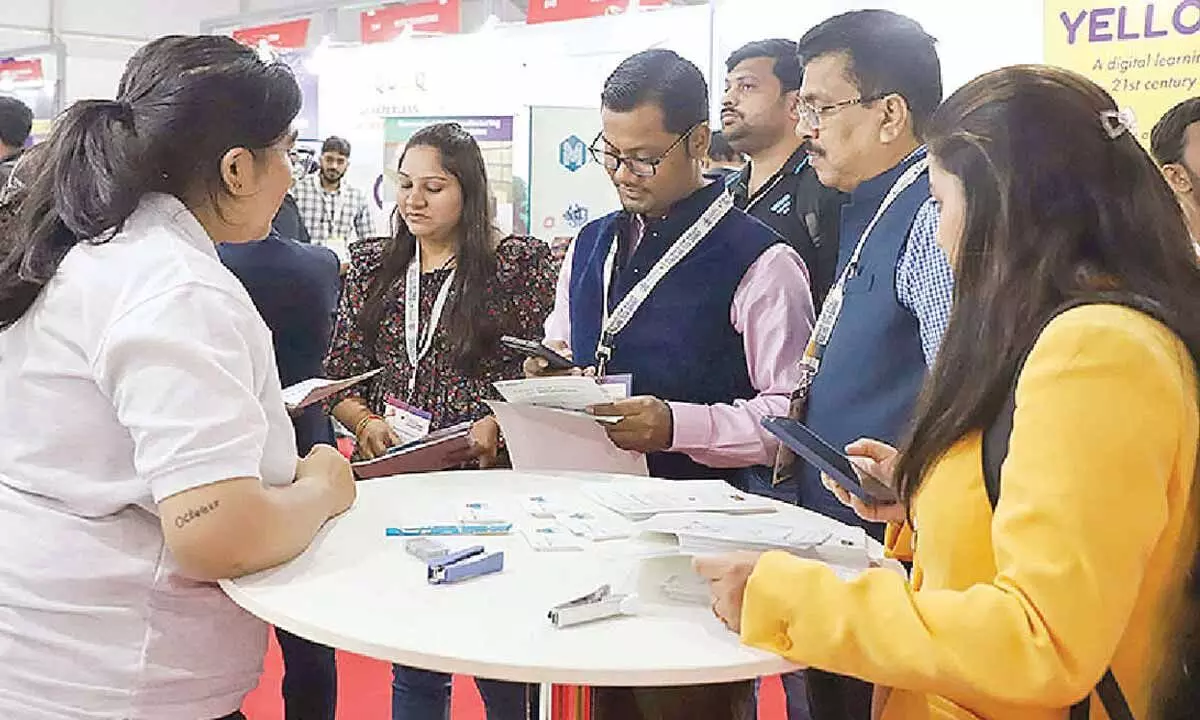Live
- Afghanistan won't tolerate any aggression, warns Kabul after Pakistani airstrikes that killed 46
- India a global leader in disaster warning systems: Jitendra Singh
- India vs Australia 4th Test Day 1: Bumrah Shines as Australia Holds the Advantage at MCG
- Adani's Vizhinjam port welcomes 100th vessel within 6 months of operations
- Squid Game Season 2 Now Streaming on Netflix: Cast, Plot, and Release Details
- Gottipati Ravi Kumar Criticizes YS Jagan Mohan Reddy’s Power Sector “Tughlaq Acts”
- PKL: Haryana Steelers exude confidence ahead of playoffs as battle for title begins
- South Africa leg of CT 2025 trophy tour concludes, next stop Australia
- BJD couldn’t counter BJP’s lies, says Naveen
- Indian advertising, marketing sector sees a steady 9 pc hiring intent: Report
Just In
Posters on novel solutions to problems at Tech Summit


For Rachita CM, a student of Jain University School of Sciences, who has developed what she terms as anti-pollution bombs with her fellow students, in which environment-friendly enzymes are infused in water soluble “bombs” that eat away the pollutants present in contaminated water bodies, being at a gathering like the Bengaluru Tech Summit is a great confidence booster
Bengaluru: Posterson novel solutions to myriad problems - from water pollution to skull fracture detection - were on display at Bengaluru Tech Summit that concludes here on Thursday. The attention that their college project got at the 27th Bengaluru Tech Summit took friends, college mates and fellow researchers Agampodi SandalinInupama De Zoysa, Akshaya P R, Thejas M and Koushiki by surprise.
Representing Jain Deemed to be University’s department of Life Sciences, the young researchers had submitted their project for the Bio Posters competition of the Bengaluru Tech Summit. “We had proposed using glucomannan, a plant-derived polysaccharide, which is used frequently in food industry, for sanitary pads, because we figured out it offers many advantages, the most crucial of them all is the fact that it is biodegradable,” said Zoysa, the lead researcher who is from Sri Lanka.
Even considering that used sanitary pads are a biohazard waste and a problem that most governments are looking to solve, the young researchers said they were overwhelmed by the response they got in two days. “Most wanted to understand how far we are into this and whether this could work out really. One person even gave us the contact of another startup, Anabio, that is already making flushable sanitary pads, urging us to get in touch with them to take our project further,” said Thejas.
Tucked away deep inside the exhibition hall at the Bengaluru Tech Summit -- where companies from all across the world were showcasing their products -- posters exploring topics ranging from ‘anti-pollution bombs’ to biotraps for mosquitoes were displayed.
Bio Posters competition is a platform for young researchers to showcase their breakthrough ideas in biopharma, agritech. medtech and other biotech sectors, said Prabha Sharon, co-ordinator of the event. Through this platform, the researchers, majority of whom are students, are given an opportunity to connect with influential delegates and mentors, she added.
Some projects, like the one submitted by Vaishali V H and Avatika R B, recent graduates from BLDEA’s V P Dr PG Halakatti College of Engineering and Technology from Vijaypura, are already at pilot-test level. “We proposed a novel approach to skull fracture detection using convolutional neural networks (CNN). Our method reduces processing time as well as false positives which are crucial for a head injury,” said Vaishali to PTI.
According to her, their method involves providing the algorithm with labelled medical images, indicating the presence or absence of skull fractures. “Once trained, the model can then be used to automatically detect and localise skull fractures in new, unseen images,” added Vaishali. She and her fellow researchers have already tested the efficacy of their method at the BLDE(DU) Shri B M Patil Hospital Medical College and Research Centre, added Vaishali.
“We thought the Bengaluru Tech Summit will be a good opportunity for us to take our project to a much bigger audience,” said Avatika, adding that they are happy with all the attention that their work has received at BTS. In their poster, Harshita Neje and Kiran Kubasad, have even broken down the cost involved in the production of their idea, an entirely herbal formulated tick spray/gel for cattle and other domestic animals, so that the product can be priced at Rs 25 per unit.
The biotechnology students of Basaveshwar Engineering College, Bagalkote, said they were lucky as they were only tweaking something already formulated by their mentor and professor. “They had developeda soap using the same formula, but the problem with the soap was that the same bar could not be used in multiple animals. We were also looking for something that could be sprayed in the surrounding areas as tick infestation usually required us to disinfect the entire area,” said Harshita.
For Rachita CM, student of Jain University School of Sciences, who has developed what she terms as anti-pollution bombs with her fellow students, in which environment-friendly enzymes are infused in water soluble “bombs” that eat away the pollutants present in contaminated water bodies, being at a gathering like the Bengaluru Tech Summit is a great confidence booster. “Forget about winning or anything, just the fact that so many people showed interest in what we have worked on for months on end make us feel good,” said Rachita. According to Sharon, this year, 101 young researchers from universities from across Karnataka had displayed posters of the projects.

© 2024 Hyderabad Media House Limited/The Hans India. All rights reserved. Powered by hocalwire.com






